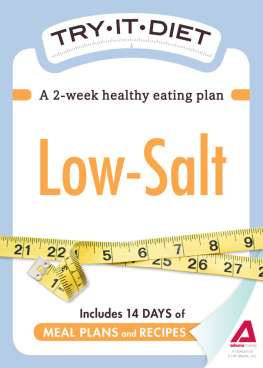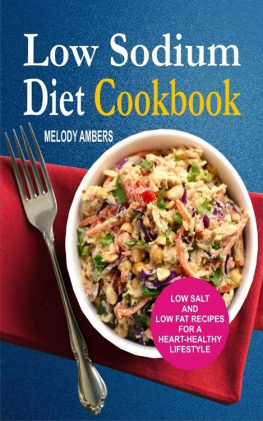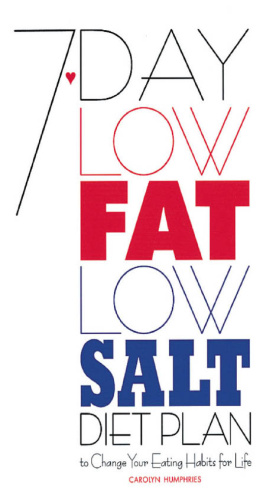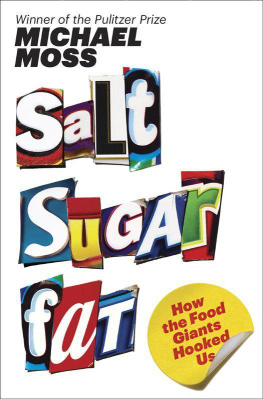Michael F. Jacobson - Salt Wars: The Battle Over the Biggest Killer in the American Diet
Here you can read online Michael F. Jacobson - Salt Wars: The Battle Over the Biggest Killer in the American Diet full text of the book (entire story) in english for free. Download pdf and epub, get meaning, cover and reviews about this ebook. year: 2020, publisher: MIT Press, genre: Politics. Description of the work, (preface) as well as reviews are available. Best literature library LitArk.com created for fans of good reading and offers a wide selection of genres:
Romance novel
Science fiction
Adventure
Detective
Science
History
Home and family
Prose
Art
Politics
Computer
Non-fiction
Religion
Business
Children
Humor
Choose a favorite category and find really read worthwhile books. Enjoy immersion in the world of imagination, feel the emotions of the characters or learn something new for yourself, make an fascinating discovery.

- Book:Salt Wars: The Battle Over the Biggest Killer in the American Diet
- Author:
- Publisher:MIT Press
- Genre:
- Year:2020
- Rating:3 / 5
- Favourites:Add to favourites
- Your mark:
- 60
- 1
- 2
- 3
- 4
- 5
Salt Wars: The Battle Over the Biggest Killer in the American Diet: summary, description and annotation
We offer to read an annotation, description, summary or preface (depends on what the author of the book "Salt Wars: The Battle Over the Biggest Killer in the American Diet" wrote himself). If you haven't found the necessary information about the book — write in the comments, we will try to find it.
Salt Wars: The Battle Over the Biggest Killer in the American Diet — read online for free the complete book (whole text) full work
Below is the text of the book, divided by pages. System saving the place of the last page read, allows you to conveniently read the book "Salt Wars: The Battle Over the Biggest Killer in the American Diet" online for free, without having to search again every time where you left off. Put a bookmark, and you can go to the page where you finished reading at any time.
Font size:
Interval:
Bookmark:
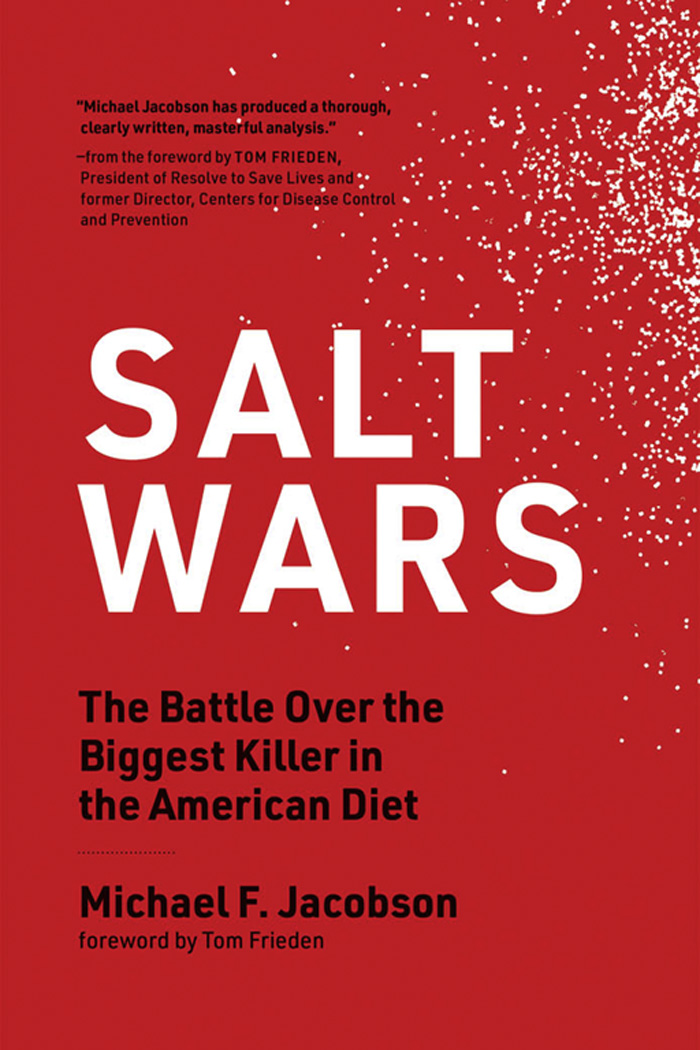
Michael F. Jacobson
foreword by Tom Frieden
The MIT Press
Cambridge, Massachusetts
London, England
2020 Center for Science in the Public Interest
All rights reserved. No part of this book may be reproduced in any form by any electronic or mechanical means (including photocopying, recording, or information storage and retrieval) without permission in writing from the publisher.
This book is not intended to provide medical advice, which should be obtained from a qualified health professional.
This book was set in ITC Stone Serif Std and ITC Stone Sans Std by New Best-set Typesetters Ltd.
Library of Congress Cataloging-in-Publication Data
Names: Jacobson, Michael F., author.
Title: Salt wars: the battle over the biggest killer in the American diet / Michael F. Jacobson.
Description: Cambridge, Massachusetts : The MIT Press, [2020] | Includes bibliographical references and index.
Identifiers: LCCN 2020002678 | ISBN 9780262044448 (hardcover)
Subjects: MESH: Sodium Chloride, Dietaryadverse effects | Diettrends | Nutrition Policy | United States
Classification: LCC RM237.8 | NLM WA 712 | DDC 613.2/8522dc23
LC record available at https://lccn.loc.gov/2020002678
10 9 8 7 6 5 4 3 2 1
To Donna and Sonya, with love
d_r0
Salt kills.
And that has led to a wara life-and-death, but largely invisible, conflict. Between taste preferences formed when we were hunter-gatherers foraging for sustenance and our current environment of ultraprocessed, superabundant food. Between industrial profits and the publics health. Between misguided and sometimes corrupt scientists who have created a pseudo-controversy and rigorous researchers. Michael Jacobson has produced a thorough, clearly written, masterful analysis in Salt Wars.
It is a one-hundred-year war. Scientists first established evidence that salt kills a century ago, including a demonstration that a low-sodium diet could reverse hypertension. It is a war fought in the halls of Congress, the pages of scientific journals, and the aisles of supermarkets. It is a war with heroes, heroines, and villainswith millions of lives at stake. But, most importantly, it is a war that has not yet been won.
Excess salt intake kills an estimated 3 million people a year around the world and causes millions more strokes and heart attacks. And excess salt drives up health-care costs and undermines family, community, and national finances.
For more than fifty years, the US government has pledged to better protect Americans from heart attacks and strokes by reducing sodium in food. And, for fifty years, the US government has failed to do so. Why?
Three forces have blocked efforts to protect Americans from excess salt: scientific error, industry opposition, and the inherent difficulty of reducing sodium.
Scientific error is the most frustrating of the three. As Jacobson reviews, several scientific groups have purported to discover that at the lowest level of sodium intake, mortality increases. These groups claim to have found a so-called J- or U-shaped causal relationship, whereby both low and high levels of consumption increase health risk. Fortunately, there is now definitive proof that the salt skeptics are wrong. Reducing sodium lowers blood pressure and is associated with reduced risk of heart attacks and strokes. The J-shaped relationship described is the result of errors in study design: measurement of sodium intake has been inaccurate, the formula used to convert a single small urine sample into estimated consumption is fatally flawed, and, in some studies, subjects with the lowest sodium intakes died at a higher rate because they had worse health to begin with, unrelated to sodium intake. Recent analyses have demonstrated that the actual relationship that shows increasing mortality with increasing sodium appears, artifactually, to be J-shaped when these flawed methods are used.
The second force working for salt is easier to understandmoney. Salt is cheap. It draws in water, which is even cheaper; foods in brine sold by weight have a higher profit margin. Salt encourages consumption, so industry is concerned, with reason, that if it reduces salt in the food it markets to people they will consumeand buyless. And industry is inherently opposed to regulation. Like the infamous Tobacco Institute, which misled Congress and the public for decades by claiming that nicotine was not addictive and tobacco not harmful, the Salt Institute spread doubt and controversy for decades about the science of salt.
The third forcewe like salt!is essential to understand. One of my earliest memories is of pouring salt from a Morton box into my hand and licking it from my palm, feeling the tingling tartness on my tongue. We need saltwithout it we would die, and some of our food would spoil sooner. Our tastes were created eons ago when salt was hard to come by, but its cheap, plentiful, and deadly in the amounts we consume today. We need only a tiny fraction of what we consume. Salt is tricky: most of our salt intake doesnt come from salty foods but from foods we eat a lot of, such as bread. In higher-income countries, most salt is invisible to us in the food we buy in supermarkets and at restaurants. In lower-income countries, excess salt is added during cooking. If we steadily reduced the amount of salt we eat, our perception of what is salty will change steadily as well. If we do this, the food we eat now would taste unbearably salty, and our blood pressure and risk of heart attack would plummet.
For decades, Michael F. Jacobson and the Center for Science in the Public Interest have been strategic and persistent warriors against pro-salt forces. They have sued the United States Food and Drug Administrationtwice; lobbied Congress and successive administrations; and publicized shockingly high levels of salt in restaurant and other food. Jacobsons voicemethodical, passionate, plainspokencomes through clearly in these pages.
Forces protecting people from excess salt have made progress on several fronts. Chile has shown that stark warning labels on the front of packages can cause industry to reformulate products quickly. Industry often claims that making change is impossibleuntil it is required to do so, after which it finds change surprisingly easy. Reducing sodium in most products by 2030 percent can be done with virtually no one noticing. Further reductions are possible through both gradual changes in taste and, potentially, clever innovations in salt technology.
The United Kingdom set targets and held industry accountable for progress, saving lives and money in the process. This health by stealth approach worked: sodium intake gradually decreased, as did blood pressure and cardiovascular death rates. By encouraging all companies to reduce sodium, the UK showed that it is possible to overcome the tragedy of the commonsif one company reduces salt while others dont, that company may be at a competitive disadvantage. The importance of having an eyes-wide-open approach toward industry was confirmed when a new UK government reversed course and relied on voluntary efforts by industry. Progress stalled, resulting in thousands of preventable heart attacks and strokes.
Pro-health forces also have new weapons. Reformulated salt, including structural changes and replacement of some sodium with potassium, can cut sodium content by 2050 percent with little or no impact on taste for many products.
The war on salt can be wonbut only with a concerted and strategic effort that relies on leadership in government and in society. In the United States and other high-income countries, where most food consumed is packaged or restaurant food, strong and persistent policies such as those enacted in Chile and begun in the United Kingdom that create strong incentives for industry to reduce salt will be essential. For food made at homethe dominant source of excess sodium for people in lower-income countriestools and information that empower people who cook will be needed.
Next pageFont size:
Interval:
Bookmark:
Similar books «Salt Wars: The Battle Over the Biggest Killer in the American Diet»
Look at similar books to Salt Wars: The Battle Over the Biggest Killer in the American Diet. We have selected literature similar in name and meaning in the hope of providing readers with more options to find new, interesting, not yet read works.
Discussion, reviews of the book Salt Wars: The Battle Over the Biggest Killer in the American Diet and just readers' own opinions. Leave your comments, write what you think about the work, its meaning or the main characters. Specify what exactly you liked and what you didn't like, and why you think so.

